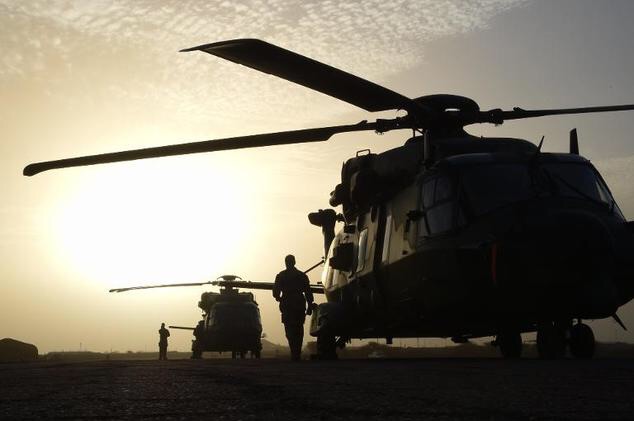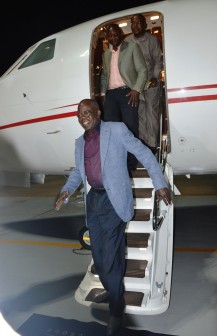French helicopters are stationed at a base in Goa, on January 2, 2015 as part of Operation Barkhane ©Dominique Faget (AFP/File)
France has found itself the best positioned Western nation to assist in the regional fight against Boko Haram — but also the most vulnerable to being sucked into an open-ended war, experts say.
Despite the presence of 3,000 troops in the region under France’s Barkhane operation battling jihadist groups around the Sahel, Paris insists it will limit itself to “indirect support” of the widening African effort to combat Boko Haram.
But as cross-border attacks and atrocities by the Nigerian extremist group force a growing number of countries to respond, France may find itself unable to merely provide assistance at a safe distance.
A key factor in that dilemma will be whether the 8,700 troops that the governments of Niger, Nigeria, Chad, Cameroon and Benin have committed to fighting Boko Haram in and around the group’s northern Nigerian stronghold will suffice to drive back its six-year insurgency that has left over 13,000 people dead.
Thus far, that challenge has been answered by the extremists increasing the frequency, violence and audacity of their strikes.
Should that collective African effort fail, Paris would be hard-pressed to continue limiting its involvement to logistical and intelligence support, air surveillance, and military coordination — especially if Boko Haram began occupying wider territory outside Nigeria.
“Our role is to aid neighbouring countries facing a mortal threat,” said a French diplomatic source, who nevertheless acknowledges it would be difficult to refuse requests for air support from Niger were Boko Haram to escalate attacks inside its border with Nigeria.
– ‘Mortal threat’ –
A spate of Boko Haram strikes on the southern Niger town of Diffa this week has already led France to dispatch a group of military advisers to the panicked zone, the source said.
French resistance to directly entering the battle would wane further if experienced and formidable Chadian forces suffered serious losses, or otherwise proved incapable of beating the extremist threat down.
Chad boasts by far the mightiest army in the region, and is France’s main African military ally. Chadian soldiers provided irreplaceable ground help chasing Islamist militias that had taken control of northern Mali into the desert, as French power struck from the air.
It is now urgent to provide Chad “support very, very fast,” the diplomat said, especially because fierce, war-hardened Chadian forces represent “the only rampart” against Boko Haram in the region.
In the meantime, Paris might well find it impossible to confine its 3,000-strong regional force to Chad, Mali, Niger, Burkina Faso and Mauritania if Boko Haram continues striking out from Nigeria into southern Niger and western Cameroon — and perhaps even staged its first incursion into Chad.
Unlike its operation against jihadist militias in the Sahel, an active French role in the fight against Boko Haram would likely require troops on the ground as well as the air.
Paris is seeking to avoid such scenarios by urging international partners to join France in helping affected African nations help themselves against the extremists.
“France cannot settle all the world’s conflicts,” French President Francois Hollande said during a February 5 press conference, at which he scolded global powers for insufficient involvement in combatting Boko Haram.
– ‘Evil genie’ –
“It’s certain that Boko Haram is creating a major crisis, and that all (foreign countries) are responding to it far too slowly,” agreed a European diplomat, who nevertheless rejected French criticism that Europe is not trying to help with reminders the European Union has offered Nigeria security assistance for nearly five years — which Abuja has repeatedly rejected.
Specialist Marc-Antoine Perouse de Montclos agreed that because Boko Haram is first and foremost a Nigerian entity, the key to defeating it must come from or through Nigeria’s government.
“Resolution to the crisis has to come from Abuja, (which) isn’t participating,” in the regional battle, Perouse de Monclos wrote in an analysis published Thursday by the Jean Jaures Foundation.
In it, he suggests a greater role should be played by Britain, since the “former colonial power is maintaining a low profile, (while) France has little or no diplomatic influence.”
But with Nigeria’s presidential elections now postponed due to the insecurity and chaos created by Boko Haram, one diplomat warns the electoral stakes may now be too high for central powers in Abuja to take on “an evil genie they created themselves, and which has escaped the b














